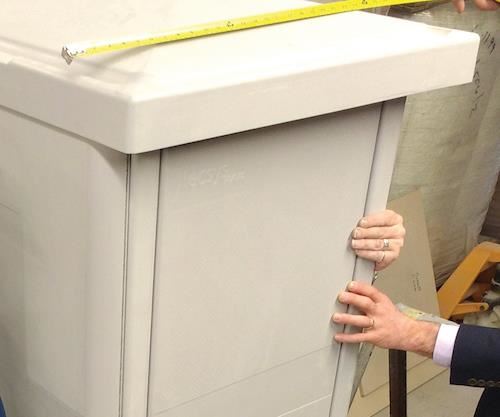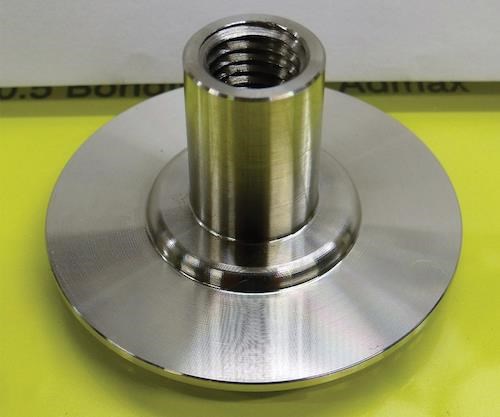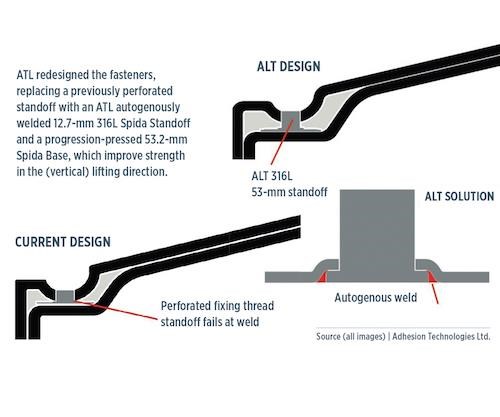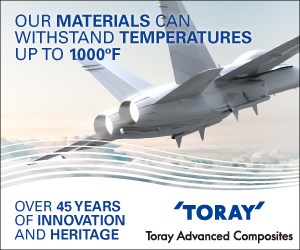Redesigned bonded fasteners enable RTM railway cabinets
Adhesion Technologies Ltd. (ATL, Hampshire, UK) has developed a range of in-mold bonded fasteners, which reduce build time by eliminating the need for hole-drilling.
Adhesion Technologies Ltd. (ATL, Hampshire, UK) has developed a range of in-mold bonded fasteners, which reduce build time by eliminating the need for hole-drilling. Designed by composite engineers in conjunction with Southampton University and the UK government-funded Farnborough Aerospace Consortium, ATL’s patented products comprise more than 2,000 variants, including manganese-boron alloy, 316L stainless steel and thermoplastics as well as a castellated base option, which boosts torsional strength by 24%. Trademarked Spida Fixings, these fasteners have been designed to dissipate stress in composite structures, can be epoxy-coated to reduce risk of galvanic corrosion and are used in composite structures made via vacuum.
Recently, ATL was approached by a leading industrial composites manufacturer in the UK that developed
a composite solution for railway trackside control cabinets. Although these electronics enclosures are traditionally metal, they are now benefitting from composites’ improved resistance to corrosion, vibra- tion and vandalism/theft, as well as insulation against electrical conductivity. The cabinet brought to ATL weighs 1,000 kg fully assembled and features a one-piece structural roof made by RTM. Such cabinets are typically relocated multiple times throughout their lives using a crane. The crane lifts the cabinet by chain hooks connected to four removable 12-mm threaded eyebolts in the roof. Unfortunately, the fasteners for the eyebolts were separating at the interface between the nut and the perforated, welded base.
ATL worked with the manufacturer to redesign the fasteners, switching the previously perforated standoff with an ATL autogenously welded 12-mm 316L Spida Standoff and a progression-pressed 53-mm Spida Base (see photos). Stronger autogenous welding supersedes previously soldered joints in fastener components for a stronger construction: The new design is said to align the metal grain flow in the fastener with the stresses applied by chain hooks during lifting. The Spida Standoff also reportedly features a 54% increase in surface bond area thanks to ATL’s Admax surface enhancement treatment.
Samples of the trackside cabinet’s RTM roof with ATL-redesigned fasteners are being manufactured now for certification testing. New trackside enclosures will be manufactured in spring 2017 for installation next summer. ATL is now receiving more requests for technical advice and integration of their fixing solutions into similar composite products. The company exhibited the technology in CW’s Future Materials display at the 2016 International BoatBuilders’ Exhibition & Conference (IBEX, Oct. 4-6, Tampa, FL, US)
Related Content
-
JEC World 2022, Part 3: Emphasizing emerging markets, thermoplastics and carbon fiber
CW editor-in-chief Jeff Sloan identifies companies exhibiting at JEC World 2022 that are advancing both materials and technologies for the growing AAM, hydrogen, automotive and sustainability markets.
-
TU Munich develops cuboidal conformable tanks using carbon fiber composites for increased hydrogen storage
Flat tank enabling standard platform for BEV and FCEV uses thermoplastic and thermoset composites, overwrapped skeleton design in pursuit of 25% more H2 storage.
-
Composites enable epic interior for Museum of the Future
For this one-of-a-kind lobby, AFI pioneered digital, reconfigurable molds to achieve organic-shaped, multifunctional panels and stairwell cladding.
















